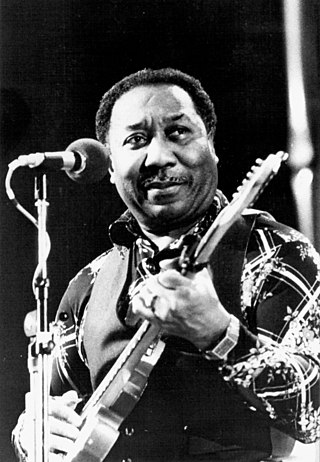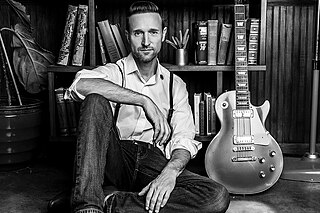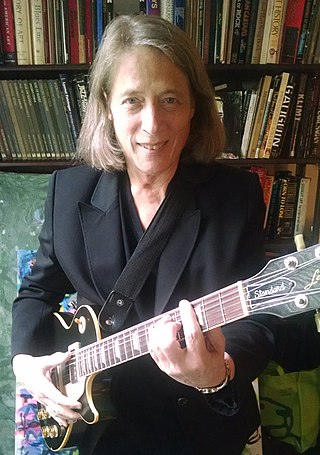Related Research Articles

McKinley Morganfield, known professionally as Muddy Waters, was an American blues singer and musician who was an important figure in the post-World War II blues scene, and is often cited as the "father of modern Chicago blues". His style of playing has been described as "raining down Delta beatitude".

George "Buddy" Guy is an American blues guitarist and singer. He is an exponent of Chicago blues who has influenced generations of guitarists including Eric Clapton, Jimi Hendrix, Jimmy Page, Keith Richards, Stevie Ray Vaughan, Jeff Beck, Gary Clark Jr. and John Mayer. In the 1960s, Guy played with Muddy Waters as a session guitarist at Chess Records and began a musical partnership with blues harp virtuoso Junior Wells.

A guitar solo is a melodic passage, instrumental section, or entire piece of music, pre-written to be played on a classical, electric, or acoustic guitar. In 20th and 21st century traditional music and popular music such as blues, swing, jazz, jazz fusion, rock and heavy metal, guitar solos often contain virtuoso techniques and varying degrees of improvisation. Guitar solos on classical guitar, which are typically written in musical notation, are also used in classical music forms such as chamber music and concertos.

Junior Wells was an American singer, harmonica player, and recording artist. He is best known for his signature song "Messin' with the Kid" and his 1965 album Hoodoo Man Blues, described by the critic Bill Dahl as "one of the truly classic blues albums of the 1960s". Wells himself categorized his music as rhythm and blues.

Lonnie Brooks was an American blues singer and guitarist. The musicologist Robert Palmer, writing in Rolling Stone, stated, "His music is witty, soulful and ferociously energetic, brimming with novel harmonic turnarounds, committed vocals and simply astonishing guitar work." Jon Pareles, a music critic for the New York Times, wrote, "He sings in a rowdy baritone, sliding and rasping in songs that celebrate lust, fulfilled and unfulfilled; his guitar solos are pointed and unhurried, with a tone that slices cleanly across the beat. Wearing a cowboy hat, he looks like the embodiment of a good-time bluesman." Howard Reich, a music critic for the Chicago Tribune, wrote, "...the music that thundered from Brooks' instrument and voice...shook the room. His sound was so huge and delivery so ferocious as to make everything alongside him seem a little smaller."
George Warren Barnes was an American swing jazz guitarist. He was also a conductor, composer, arranger, producer, author, and educator. He was hired by the NBC Orchestra at the age of 17, making him the youngest musician on staff. At 17, he was considered to be a great player by many musicians, including Tommy Dorsey, and Jimmy McPartland. Barnes was also proficient as a recording engineer. During his career, Barnes recorded with singers Mel Tormé, Ella Fitzgerald, Frank Sinatra, Bing Crosby, Patti Page, Dinah Washington, Lena Horne, Billy Eckstine and Johnny Mathis among many others. He was an inspiration to, and influenced guitarists Chet Atkins, Roy Clark, Herb Ellis and Merle Travis, among many others.

An organ trio is a form of jazz ensemble consisting of three musicians; a Hammond organ player, a drummer, and either a jazz guitarist or a saxophone player. In some cases the saxophonist will join a trio which consists of an organist, guitarist, and drummer, making it a quartet. Organ trios were a popular type of jazz ensemble for club and bar settings in the 1950s and 1960s, performing a blues-based style of jazz that incorporated elements of R&B. The organ trio format was characterized by long improvised solos and an exploration of different musical "moods".

JW-Jones is a Canadian blues guitarist, singer, songwriter and band leader. He is a Juno Award nominee (2015), Billboard magazine Top 10 Selling artist, and winner of the International Blues Challenge for "Best Self-Produced CD Award" for his release 'High Temperature' in 2017 and Best Guitarist in 2020.

Lafayette Leake was an American blues and jazz pianist, organist, vocalist and composer who played for Chess Records as a session musician, and as a member of the Big Three Trio, during the formative years of Chicago blues. He played piano on many of Chuck Berry's recordings.
Jack Leroy Petersen is an American jazz guitarist and educator. He was a pedagogical architect for jazz guitar and jazz improvisation at Berklee College of Music, University of North Texas College of Music, and University of North Florida.

Bobby Radcliff is an American blues guitarist, singer and songwriter. Radcliff was raised in Bethesda, Maryland and started playing guitar in his early teens.

Mark Paul "Corky" Siegel is an American musician, singer-songwriter, and composer. He plays harmonica and piano. He plays and writes blues and blues-rock music, and has also worked extensively on combining blues and classical music. He is best known as the co-leader of the Siegel-Schwall Band, and as the leader of the Chamber Blues group.

Martin J. Sammon was an American blues keyboardist. He was recognized for his energetic performances, improvisation and mastery of traditional styles, having established himself as an ambassador of Chicago blues with appearances on several commercially distributed DVDs, television shows and Grammy Award-winning albums. His book Blues Keyboard Method, with a foreword by Chuck Leavell, of the Rolling Stones, was published by Hal Leonard in 2015.
Lacy Gibson was an American Chicago blues guitarist, singer and songwriter. He notably recorded the songs "My Love Is Real" and "Switchy Titchy" and in a long and varied career worked with Buddy Guy and Son Seals.
Lefty Bates was an American Chicago blues guitarist. He led the Lefty Bates Combo and worked with the El Dorados, the Flamingos, Jimmy Reed, John Lee Hooker, Buddy Guy, Etta James, the Aristo-Kats, the Hi-De-Ho Boys, the Moroccos, and the Impressions. A regular on the Chicago blues scene, his major work was as a session musician on numerous recordings in the 1950s and 1960s.

Ronnie Baker Brooks is an American Chicago blues and soul blues guitarist, singer and songwriter. He was a respected club performer in Chicago, even before recording three solo albums for Watchdog Records. The son of fellow Chicago blues musician Lonnie Brooks, he is the brother of another blues guitarist, Wayne Baker Brooks.

William Keith Pitman was an American guitarist and session musician.

Terry Robb is a Canadian fingerstyle guitarist, composer, arranger and record producer living in the United States. He plays electric and acoustic guitar, and is associated with the American Primitive Guitar genre through his collaboration with steel string guitarist John Fahey. He is a member of the Oregon Music Hall of Fame and Cascade Blues Association Hall of Fame, and was honored with the eponymous "Terry Robb" Muddy Award for Best Acoustic Guitar in 2011. His original compositions draw on the Delta blues, ragtime, folk music, country music and jazz traditions.
Ladell McLin is an American blues musician.
References
- ↑ Huckabey, Warren (2003-01-19). "The Bloom School of Jazz". Allaboutjazz.com. Retrieved 2016-10-06.
- ↑ Rick Kogan (2005-02-06). "Bloom's Picks For Starting A Jazz Collection". Articles.chicagotribune.com. Retrieved 2016-10-06.
- ↑ Miner, Michael. "Jazz in Bloom | Feature". Chicago Reader . Retrieved 2016-10-06.